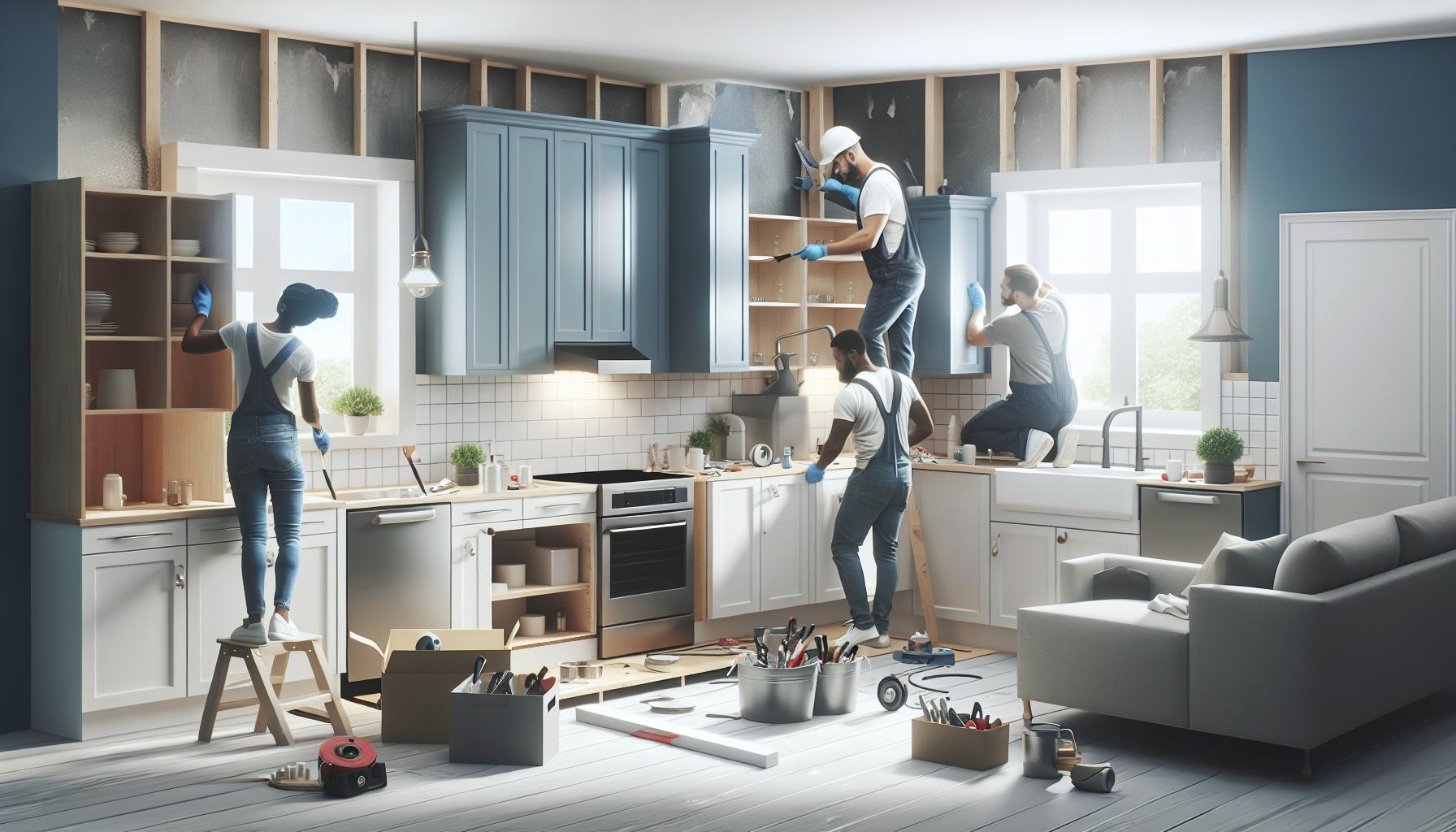Renovating a home can be both exciting and daunting, especially when it comes to financing the project. Many homeowners dream of transforming their spaces into something more functional or aesthetically pleasing, but the cost can be a significant hurdle. That’s where a mortgage for home renovation comes into play, offering a viable solution to fund those improvements without breaking the bank.
I’ve seen how leveraging a renovation mortgage can open doors to possibilities that might otherwise remain out of reach. Whether you’re looking to update an outdated kitchen, add an extra room, or simply enhance your home’s energy efficiency, understanding how these mortgages work can be a game-changer. With the right approach, you can increase your property’s value while enjoying a refreshed living space. Let’s delve into the essentials of securing a mortgage for your renovation needs and explore the benefits it can bring to your home improvement journey.
Key Takeaways
- Renovation mortgages provide an efficient way to finance home improvements by combining funds for purchasing and remodeling into a single loan, potentially offering better terms based on the home’s projected post-renovation value.
- Several types of renovation mortgages are available, such as FHA 203(k), Fannie Mae HomeStyle, VA Renovation Loan, and Freddie Mac CHOICERenovation, each catering to different needs and eligibility requirements.
- Using a renovation mortgage can increase your property value, offer potential tax benefits, and enable energy-efficient upgrades, which can provide both short- and long-term financial advantages.
- Choosing the right renovation mortgage involves assessing renovation needs, comparing interest rates and terms, and consulting with a mortgage specialist to ensure alignment with your financial strategy.
- The application process for a renovation mortgage requires preparing financial documents, evaluating your credit score, and selecting a suitable lender to secure necessary funding for home renovations.
- Overcoming challenges in renovation projects, such as managing unexpected costs, staying within budget, and dealing with delays, requires careful planning, setting priorities, and maintaining clear communication with contractors.
Mortgage for Home Renovation
Renovation mortgages provide a viable path for homeowners looking to finance improvements. They blend the properties of a home loan and renovation loan.
What Is A Renovation Mortgage?
A renovation mortgage combines funds for buying a home and funds for renovations into a single loan. It streamlines the financing process, providing both convenience and efficiency. Lenders consider the projected value of the home after renovations, which can result in better terms than traditional loans. These mortgages often cover repair, remodel, and upgrade costs, making significant home changes more manageable.
Types Of Renovation Mortgages Available
Different types of renovation mortgages cater to varying needs and preferences:
- FHA 203(k) Loan: This government-backed option supports homes needing extensive repairs. It’s ideal for purchasing and renovating older properties.
- Fannie Mae HomeStyle Renovation: This option offers flexibility for various renovation needs, covering minor and structural improvements.
- VA Renovation Loan: Exclusively for eligible veterans, this loan provides favorable terms for those wishing to enhance their homes.
- Freddie Mac CHOICERenovation Loan: Allows homeowners to repair or upgrade using modern, sustainable methods.
Each type presents unique advantages, meeting diverse homeowner requirements based on eligibility and project scope.
Benefits Of Using A Mortgage For Home Renovation

Using a mortgage for home renovation offers several advantages, providing both financial and lifestyle benefits. These include increasing property value, potential tax incentives, and enabling energy-efficient upgrades.
Increased Property Value
A well-planned renovation enhances home value, making renovation mortgages a smart investment. Upgrading elements like bathrooms, kitchens, or outdoor spaces can boost property appraisal. For example, kitchen remodels often yield significant returns, attracting future buyers and providing a competitive edge in the real estate market.
Potential Tax Benefits
Renovation mortgages might offer tax deductions or credits, depending on local regulations. Interest paid on a renovation mortgage could be deductible, lowering overall taxable income. Homeowners installing energy-efficient systems may also qualify for additional tax credits, creating further financial incentives to renovate through a mortgage.
Incorporating Energy-Efficient Upgrades
Energy-efficient upgrades enhance home comfort and sustainability while reducing utility bills. Renovation mortgages allow homeowners to invest in solar panels, enhanced insulation, or ENERGY STAR appliances. These improvements contribute to reducing environmental impact and can significantly decrease monthly energy expenses, providing long-term savings.
How To Choose The Right Renovation Mortgage

Selecting the ideal renovation mortgage can simplify funding home improvements and align with your financial strategy. Understanding key factors such as needs, interest rates, and expert advice assists in making informed decisions.
Assessing Your Renovation Needs
Determining the scope of renovation accurately shapes your mortgage choice. If planning minor changes like painting or new appliances, a smaller loan suffices. For extensive projects like adding rooms or redesigning spaces, a larger loan, such as an FHA 203(k), might be necessary. Matching the loan type to the scale of work prevents over-borrowing and aligns with budget goals.
Comparing Interest Rates And Terms
Interest rates significantly impact loan costs. It’s crucial to compare rates from different lenders, considering both fixed and adjustable options. Fixed rates provide consistency, while adjustable rates may offer initial savings but can rise over time. Pay attention to fees and additional costs associated with each mortgage to ensure the total expense fits within your financial plan.
Consulting With A Mortgage Specialist
A mortgage specialist provides personalized advice based on market knowledge and individual circumstances. By discussing your renovation plans and financial status, they guide you through suitable loan options and clarify complex terms or eligibility criteria. Engaging with a specialist equips you with insights needed to select a mortgage that best suits your renovation ambitions.
Steps To Apply For A Renovation Mortgage

Applying for a renovation mortgage involves several key steps to ensure a smooth process. By understanding each step, homeowners can better navigate the application and secure the necessary funds for their home renovation projects.
Preparing Financial Documents
Gather essential financial records to streamline the application. I collect recent pay stubs, two years of W-2s or tax returns, and recent bank statements. This documentation helps lenders assess my income stability and repayment capacity.
Evaluating Your Credit Score
Reviewing my credit report provides insight into my financial health. A higher credit score often results in better loan terms. I check for discrepancies in my report and address them before applying, ensuring lenders see an accurate financial picture.
Selecting A Lender
Choosing the right lender is crucial. I compare lenders by examining interest rates, loan terms, fees, and customer reviews. Consulting with multiple lenders helps me find a competitive offer and ensures the mortgage aligns with my renovation goals.
Potential Challenges And How To Overcome Them
Renovation projects, though rewarding, often come with challenges that require careful planning and management. Exploring potential pitfalls and their solutions can help ensure a smoother renovation process.
Managing Unexpected Costs
Unexpected costs can arise during renovations due to unforeseen complications. I recommend creating a contingency fund, ideally 10-15% of the total budget, to cover surprises like structural issues or material changes. Monitoring expenses regularly helps to identify and address any deviations from the planned budget early on.
Staying Within Budget
Budget overruns are common in renovation projects. To stay within budget, I suggest setting clear priorities for must-have upgrades and desired features. I also find obtaining multiple estimates from contractors ensures competitive pricing. Regular budget reviews during the renovation enable adjustments to keep spending aligned with financial constraints.
Dealing With Renovation Delays
Delays can derail renovation timelines and increase costs. To minimize such disruptions, I advise selecting experienced contractors with a reliable track record and ensuring clear communication throughout the project. Building extra time into the schedule for potential holdups like permit approvals or supply chain issues helps manage expectations effectively.
Upgrade Their Homes
Navigating the world of renovation mortgages can be a game-changer for anyone looking to upgrade their home. By understanding the various loan options and their benefits, you can make informed decisions that align with your financial goals. It’s crucial to assess your renovation needs, compare lenders, and prepare your finances to ensure a smooth application process. With careful planning and the right mortgage, you can turn your renovation dreams into reality, enhancing both your living space and property value. Remember, tackling potential challenges head-on will help you stay on track and enjoy the rewards of a successful home renovation.

